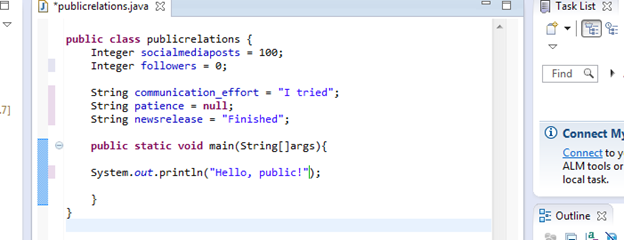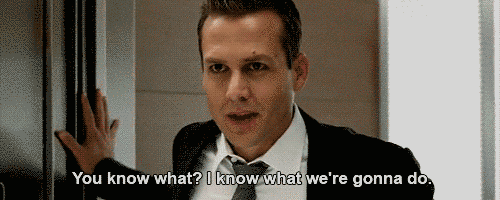Monica Albert
What do you get when you cross a program developer and a public relations consultant? I’m afraid even I can’t answer that question, and I’ve studied both in post-secondary institutions for at least a year. Although I feel I still have a long way to go, after talking with another programmer, I feel safe in saying that the two lines of speciality aren’t as different as you might think. How, you might ask? Well…
…the audience you’re writing for is always nitpicky.
If you’ve ever been fortunate enough to try your hand at programming, then you’ll know that unless you happened to have sold your soul to Satan, the process of debugging your code takes at least 10 times longer than the time it took to write it. Coding is an unfortunately finicky business – much like a public, if you have something within your message that could be potentially misinterpreted, it will probably end up doing everything but what you intended. You can always try to correct it, certainly, but there’s no guarantees that your well-intentioned fixes won’t just crack open a whole new nest of problems. No wonder making progress takes so long. Thankfully…
…you work in departments.
Whether you’re a programmer or a PR practitioner, it’s a pretty hard-knock life in the workplace. Even if you do succeed in getting your message perfected so that it will run its intended course smoothly, there will always be things too large or complex for you to comfortably handle all by yourself. Programmers and public relations professionals work in teams for that reason – what you might miss while debugging or proofreading, one of your co-workers will likely end up catching for you. If not that, they can be there to keep an eye on you. After all…
…everyone is worried you’ll go rogue.
In a way, PR and programming both offer those with the skillset a position of power –namely, over sensitive information. Although the reasons for having said power are different, that doesn’t change the push for ethics that both professors and employers alike are determined to enforce. Programmers get a bit more flack for this than PR practitioners do, since most companies fear having an incident similar to the one caused by Edward Snowden on their hands, but PR practitioners are burdened with the maintenance of the company’s reputation. Which might be for the best, since…
…nobody outside your department seems to know entirely what it is you do.
Aside from the basics, of course – a public relations technician communicates on behalf of the company, and a developer writes programs. Trying to explain that you do more than crisis management, or the logic behind the way your new calculator accepts user input through a String parsed into an integer data type will probably cause some eyes to glaze over. As it isn’t their job to know your job, that seems understandable, although it may end in fielding a few questions from unsavvy sources. But at least we can all agree that we’re unified in the fact that…
… there’s always more than one way to phrase things.
As mentioned in the first point, whether you’re experienced or new, working in lines of code or paragraphs, the act of writing to get what you want out of anything can be a difficult task. With any program, there’s more than one way to code and get the results you want, although certain methods may be tighter and more efficient than others. Considering that, both lines of work have a similar question to consider- what’s the best way to convey your message in order to get the best results? How can you phrase something so that it’s not only clear, but able to move others to be influenced by your practices? Such is a question we’ve all had to ask ourselves while making edits to our work.
In fact, it might be exactly what unites us. Although the stigmas, the mediums, and the pay may be different, practitioners of public relations and programming alike can find common ground in the fact that we are all writers in some shape or form. Perhaps by sharing in these annoyances and successes in our respective fields, we can find new ways to broaden how we think and communicate better in the future.





